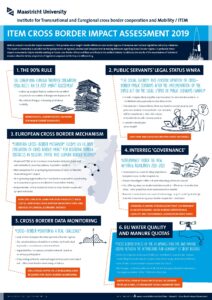This year’s report includes about six dossiers, chosen on the basis of a survey of ITEM stakeholders and other interested parties. In addition, topics may also be highlighted in the context of ITEM’s day-to-day activities under the ITEM annual cycle.
Cross-Border Impact Assessment 2019
Files
90% rule
The Minister of Health, Welfare and Sport (Ernst Kuipers) has proposed concentrating acute care in response to rising demand for emergency care and staff shortages in the Netherlands. However, concerns have been raised about the impact of this proposal on proximity and quality of care in border regions, where patients already have to travel long distances to get healthcare. While the proposal highlights the importance of better regional cooperation in the provision of care and distribution of patients, it raises the question of whether sufficient attention is paid to the impact and opportunities of Euroregional and cross-border cooperation.
Read the full dossierLaw on the standardisation of civil servants
This file provides an ex ante assessment of the impact of the expected entry into force of the Civil Servants (Normalisation of Legal Status) Act on the social security and pension situation of civil servants living and working across borders. The report has been written for the benefit in particular of cross-border civil servants in education who (currently) work in the Netherlands and live abroad - in particular by highlighting their social security and pension situation, which is currently (August 2019) somewhat unclear. In fact, employers and employees have not received enough relevant information, which calls for action on the part of the legislator.
Read the full dossierEuropean cross-border mechanism
An ex-ante assessment of the proposed European Cross-Border Mechanism (ECBM), which aims to facilitate cross-border cooperation on projects and services by resolving conflicts between national legal provisions in cross-border regions. This file provides an in-depth analysis of this proposal and pre-assesses the potential effects of the proposed regulation on the German-Dutch and Dutch-Flemish border regions.
Read the full dossierGovernance under the new Interreg Regulation
The new Interreg regulation for 2021-2027 requires each Interreg programme area to allocate at least 15% of its budget to ‘Governance’. This dossier provides an ex ante assessment of what ‘Governance’ means for different stakeholders in Benelux programme areas. It focuses on expectations of how it may affect the implementation of programmes and change their scope. The analysis leads to an assessment of the research themes of Euroregional cohesion and socio-economic development, before we draw general conclusions and recommendations from a Euroregional perspective.
Read the full dossierCross-border data
Data collection for cross-border surveillance has been a hot topic in recent years. This dossier problematises the way data collection is nationally focused and often ends at the border. Unlike the other files in this year's Border Impact Assessment, this one is an exploratory study. Instead of a full-fledged impact assessment of concrete impacts, it takes a critical look at the growing market for cross-border data, examines the limits and possibilities of today's data provision and argues for more (support for) transnational cooperation for making cross-border data widely and publicly available.
Read the full dossierNitrates Directive and manure quotas NL/DE
This dossier provides an ex post evaluation of the 1991 European Nitrates Directive, which sets quotas for the use of nitrates and manure. The analysis focuses on the effects of that directive and manure quotas. In particular, it looks at current practices regarding cross-border trade in manure and possible fraud at the Dutch-German border. In terms of sustainable socio-economic development, no clear impact of the implementation of the Nitrates Directive could be observed. Available data show no significant, but only small and regionally concentrated improvements in soil or water quality over time. Contrary to the aim of the directive, we found an increase in nitrate concentration, to levels above the allowed EU standard, in the so-called ‘problem zones’ in Germany, especially in regions close to the Dutch border.
Read the full dossier
